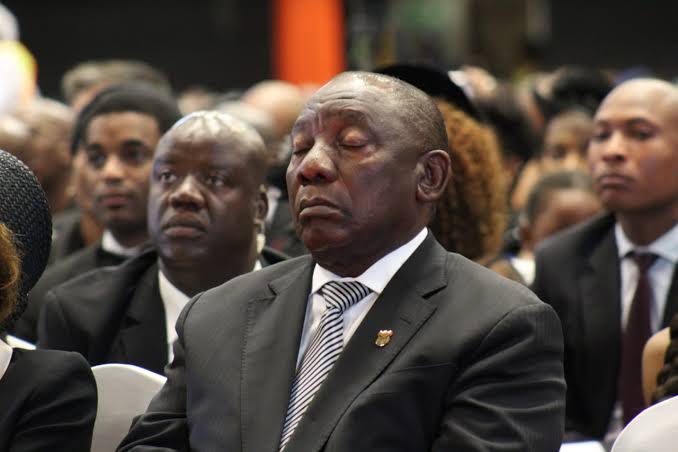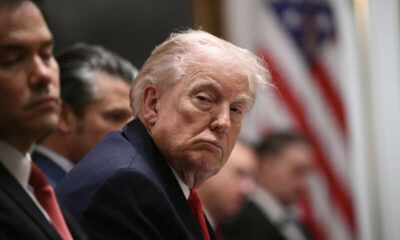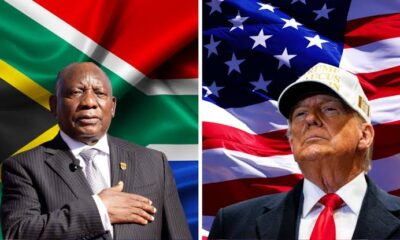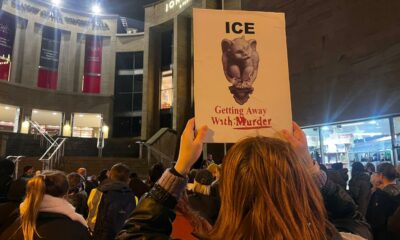News
White House Visit by Afrikaner Delegation Sparks Accusations of Sabotage from Ramaphosa’s Office

A shadow meeting in Washington has stirred political tension back home. The Presidency is calling it sabotage. The delegation says it’s patriotism. So who’s really playing politics?
A diplomatic dust-up has erupted after a group of Afrikaner representative, including members of the Freedom Front Plus, quietly visited the White House this week, just days after President Cyril Ramaphosa’s official meeting with U.S. President Donald Trump.
While the Afrikaner delegation insists the trip was about improving U.S.–South Africa relations, the Presidency isn’t buying it. Instead, officials in the Union Buildings say it was a calculated move to undermine Ramaphosa’s efforts to reset a strained diplomatic relationship.
Presidency: ‘This was sabotage, plain and simple’
Presidency spokesperson Vincent Magwenya didn’t mince his words, calling the Afrikaner visit “disturbing” and “a clear attempt to sabotage” Ramaphosa’s diplomatic progress with Trump.
“It seeks to destabilise our economy and undercut the president’s work,” Magwenya told local media. “It’s deeply irresponsible and undermines our national interests.”
The President had only recently returned from Washington, where he met with Trump alongside high-profile South Africans including businessman Johann Rupert and golfers Ernie Els and Retief Goosen. The goal of the visit, according to Ramaphosa, was to build a stronger economic foundation between the two nations, not to debate internal South African disputes.
Farm attacks: The sticking point
But for the Afrikaner delegation, one issue took centre stage: farm attacks.
They reportedly asked the U.S. government to make farm murders in South Africa a top diplomatic concern, and demanded the ANC publicly condemn the use of the “Kill the Boer” chant, whether sung or referenced in any form.
They also pushed for the exclusion of American companies from Broad-Based Black Economic Empowerment (B-BBEE) obligations, a controversial suggestion that Magwenya says risks inflaming racial tensions and misrepresenting government policy.
Magwenya: ‘This is not an Afrikaner issue’
“Murder in South Africa, wherever it happens, is already treated as a priority crime,” said Magwenya. He cited recent stats shared by Police Minister Bheki Cele that show a drop in farm-related incidents.
He also stressed that the majority of victims in these cases are often farm dwellers, not farmers , further complicating the racial narrative sometimes attached to farm attacks.
“This is not an Afrikaner issue,” Magwenya stated. “It’s a rural safety issue that affects all South Africans. We cannot allow one group to hijack a complex problem and weaponise it politically, especially not on the global stage.”
Behind closed doors in DC
While the White House has not officially confirmed the details of the Afrikaner meeting, it’s clear the timing was no coincidence. The visit took place just days after Ramaphosa’s own Oval Office engagement, where he and Trump were meant to explore economic partnerships and address recent diplomatic friction.
That meeting, however, reportedly took a turn when Trump unexpectedly steered the conversation back to farm attacks, blindsiding the South African delegation.
“It began as a warm meeting,” one insider told us, “but when Trump started bringing up farm attacks, the energy shifted. You could see the president was caught off guard.”
Social media reaction: Mixed and fiery
Online, the fallout has been polarising. Supporters of the Afrikaner groups have praised the visit as “brave” and “necessary,” accusing the ANC of ignoring rural safety and failing to protect white farmers.
But critics argue the move was “disloyal” and “disrespectful” to South Africa’s democratic process, accusing the delegation of running to a foreign power instead of engaging local institutions.
“This isn’t diplomacy it’s backdoor lobbying,” tweeted one political analyst. “And it sends the worst possible message about our national unity.”
A deeper split in South African politics
This latest incident reveals a growing fracture in how South Africa’s different political factions view the country’s global relationships and each other.
While Ramaphosa works to present a united front abroad and win back investor confidence, internal critics are taking their case to foreign leaders, often appealing to international perceptions of racial injustice, land reform fears, and crime.
Whether this approach gains traction in Washington remains to be seen. But back home, it’s sparked a political firestorm , one that underscores just how fragile the politics of race, land, and international diplomacy remain in South Africa.
As for Ramaphosa, the challenge now isn’t just managing America’s expectations, it’s managing his own country’s divided voice on the world stage.
{Source: The Citizen}
Follow Joburg ETC on Facebook, Twitter , TikTok and Instagram
For more News in Johannesburg, visit joburgetc.com



























